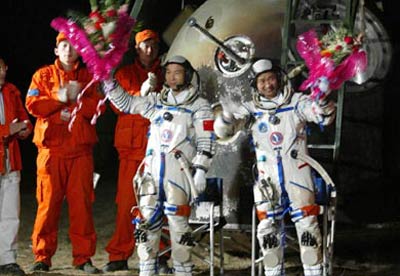In the service of the Emperorby Dwayne A. Day
|
| For China, human spaceflight reflects directly upon the leadership of the Communist Party. It is meant to enhance their power. |
This attitude is similar to that which we now know occurred with the Soviet space program during the height of the Cold War. The Soviets at times took stupid risks with ground personnel working on their rockets, such as allowing launch pad crews to approach fully-fueled rockets that then blew up horrifically. However, they also developed an effective escape system for their cosmonauts, as well as recovery forces and all kinds of other safety systems. The reason is simple: while authoritarian governments can kill hundreds, thousands, or even millions of their citizens on the ground and cover it up, human spaceflight is a highly visible event that occurs on the world stage. Kill a cosmonaut and you cannot keep it secret. Kill a cosmonaut and the leadership looks bad.
What this fact highlights is the close connection between human spaceflight and political power. For China, human spaceflight reflects directly upon the leadership of the Communist Party. It is meant to enhance their power.
The flight of Shenzhou 6 has thrown this relationship into harsh relief. Wu Bangguo, the party’s number two leader, watched the landing at the Beijing control center and remarked, “This will further improve the country’s international status and national strength, and will help to mobilize its people to rally around the Communist Party and work harder for the future of the country.” The New York Times also quoted a Beijing electrician, Li Guoqiang: “It’s really incredible and we’re all filled with pride. It’s about developing and expressing our national strength.”
While some in Congress have warned of a possible space race with China, NASA Administrator Michael D. Griffin was quick to join counterparts in India, Russia, Japan and elsewhere in congratulating the Chinese. “China, once again, has demonstrated that it is among the elite number of countries capable of human spaceflight,” Griffin stated. “We wish them well on their mission, and we look forward to [their] safe return.” That is rather normal diplomacy—the United States congratulated the Soviets over Yuri Gagarin too, through gritted teeth. But we must always keep in mind that although it is exciting to watch a new spacefaring nation advance, and it is far better that the Chinese spend their money on Shenzhous than DF-31 ICBMs, their successes cost us, at least in little ways. They help to solidify the Communist Party’s control over the citizens, and they portray China as a world power, not simply a regional one.
| China will undoubtedly try to follow the same path as the superpowers during the Space Race, with the Chinese government attempting to use each achievement for both domestic and international prestige, but gaining less domestic and international value out of human spaceflight over time. |
However, the past experience of the United States and Soviet Union also tells us something about the future that China faces in space. They, too, will derive less and less value from space spectaculars. The international and domestic prestige that can be derived from space achievements can best be understood as a series of ratchets on a downward slope. Each goal that a country achieves has a lesser effect upon prestige than the last one, unless the event is significantly greater than its predecessor. The Apollo Moon landing provided the United States with a brief moment of world prestige, surpassing previous space accomplishments. But this came amidst the Vietnam War and its value was short-lived.
It is the pursuit of prestige that would make an invitation to visit the International Space Station such a ripe plum. And it is for this reason—the legitimacy that such an offer would bestow upon China—that many in the American government will oppose any such overtures in spaceflight. China’s biggest problem with gaining prestige is that it is still China, with a reputation for brutality and suppressing its citizenry. Until there is an American president who is interested in with a new form of détente with China, this equation will not change.
China will undoubtedly try to follow the same path as the superpowers during the Space Race, with the Chinese government attempting to use each achievement for both domestic and international prestige, but gaining less domestic and international value out of human spaceflight over time. Already the world is paying less attention to the Chinese human space program than it did during Yang Liwei’s flight in 2003. China’s relatively low flight rate also tends to undercut any benefits it can reap on the international scene.
However, because rockets are inherently dangerous high-performance machines, and the harsh environment of space leaves little margin for error, eventually China will also suffer tragedy in space and will lose a crew. The citizens will mourn, the leaders will express resolve, but public support will slowly erode. Perhaps someday we will see the Chinese equivalent of a Senator Proxmire or Mondale criticizing the waste of resources on such a pointless exercise. And it is perhaps inevitable that eventually the Chinese public will come to view human spaceflight as a waste of money when the peasants need health care.
In the meantime, we can watch and enjoy the show. It will be a fun ride while it lasts.
